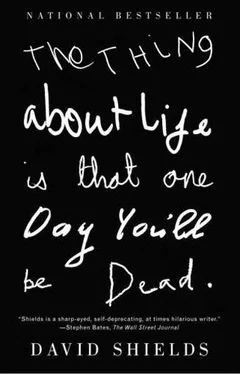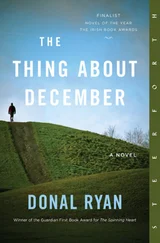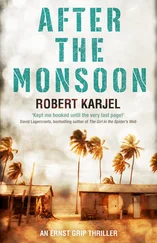My father has never even tweaked his back, never had a single physical ailment until the last few years, and yet he’s not prone to expressing gratitude for his near-century of good health (“I’ve had to see more doctors from 94 to 97 than I did from 0 to 94”). Over the last decade I’ve gone to innumerable physical therapists and doctors. One doctor said I should have back surgery immediately; he had an opening later in the week. Another doctor said all I had to do was perform one particular leg-lift exercise that Swedish nurses did, and I’d be fine. One therapist said I should run more; another therapist said I should run less. One said that human beings weren’t built to sit as much as I sit; another said people were never meant to stand upright. One thought I would need to keep seeing him for years and years; another criticized me, after a few months, for not cutting the cord. I used to feel that everything I know I learned through my lifelong struggle with stuttering; I now feel this way about my damn back. Gerald Jonas’s book about stuttering is called The Disorder of Many Theories. Back Theory seems to suffer from the same Rashomon effect: as with almost every human problem, there is no dearth of answers and no answer.
A few days after 9/11, I saw a back doctor who, unlike 95 percent of doctors I’ve ever seen, presents himself as a person rather than as an authority figure; ask him how his day is going and he’ll say, “Terrible; no one’s getting better.” He, too, has a bad back, and when he drops his folder, he’ll squat down to pick it up, the way back patients are instructed to do, rather than just lean over, the way everyone else does. When I speak to most doctors, I feel slightly or not so slightly crazy, whereas I feel like a person, like myself, when talking to Stan Herring (great name—sounds like a figure from my dad’s Brooklyn childhood, like a character from a Malamud story). At my first appointment with him, he emphasized how many of his patients with bad backs carve their entire identity out of the fact that they’re patients; they’d have no idea what to do with their lives otherwise. The WTC suicide bombers were, to Dr. Herring, similar to professional patients; their entire existence was given structure and purpose by the fetishization of their pain, their victimhood. The message was subtle, but I got it: don’t let yourself become a suicide bomber.
Herring recommended that I see a physical therapist with the unlikely name of Wolfgang Brolley, who goes by the name “Wolf” and looks and moves in a rather lupine way as well. As I am, he’s bald (with a shaved head), bespectacled, and goateed, but he’s elfin where I’m tall and lanky/clanky. I feel somewhat similar to Herring, who’s Jewish and self-deprecating; Wolf is Irish, Chicago-born, passionate, earnest, views himself unselfconsciously as a healer, goes to Zen retreats around the globe. I give him an essay I wrote about my adulation of Bill Murray (that death-haunt); he gives me an article he read about the international black-market slave trade. He directs the Center for Physical Arts and Rehabilitation, which features framed quotations from ancient Chinese philosophers and Christian mystics. He’s not my buddy; he’s something of a taskmaster. When he measured my hamstrings’ flexibility—lack thereof—he couldn’t help it: he snorted. One morning, when I called to say I felt too bad to come in for my appointment, he said, “You have to come in—that’s what I’m here for,” and gave me electronic stimulation and a massage. One of my favorite experiences in the physical world is a massage from Wolf.
I used to throw my back out completely—the classic collapse on the sidewalk and yowl to the heavens—but now, thanks in large measure to the Stan-and-Wolf program, I seem to have it under control to the point that my back never goes out completely anymore. (Knock on lumbar.) I sit on a 1" foam wedge on my chair and get up every hour to do exercises or at least tell myself I do or at least take a hot shower or apply an ice pack or a heat pad. I sleep on my side, on a latex mattress; upon waking, I don’t just sit up but rather first “find my center” (there really is such a thing, I’m pleased to report). Wolf keeps reminding me that neither he nor Dr. Herring has a solution: I have to become my own authority and view my recovery as an existential journey. I reassure him that I do, I do. I see going to the drugstore to get toothpaste as an existential journey.
And what existential journey hasn’t been aided by chemistry? I’ve been in and out of speech therapy all my life, but nothing has mitigated my stuttering as effectively as taking 0.5 mg. of alprazolam before giving a public reading. The ibuprofen, the muscle relaxants have certainly helped my back, but the Paxil has been transformative.
At first I strenuously resisted Dr. Herring’s prescription, primarily because my father has suffered from manic depression for most of his adult life. In the summer of 1956, my mother was pregnant with me, which caused my father to confess his fear that I was going to be too much of a burden for him because he had a history of depression.
“What do you mean?” my mother, who was a young 31, asked. “You get down in the dumps every now and again?”
“I think I’m on the road to having it licked,” he said, “but after the war, then again during a brief period of unemployment before we met, I needed a little electroshock to get me through some bad patches.”
Living with a manic depressive wasn’t like living with a drug addict. It wasn’t like living with a funeral. Last December, Laurie received a card that showed the words “Merry Christmas” being manufactured by a bunch of goofy little guys who looked like Santa’s sugar battalion. It was more like that: just knowing every lake is man-made and sooner or later needs to be emptied. For several years my father would be fine and funny and athletically buoyant; then one day he’d come back with an entire roll of negatives of the freeway. Once, in Sacramento on behalf of the poverty program, he mailed me an epistle consisting entirely of blank pages—for no real reason that I could make out. Another time, I was looking for some leftovers in the fridge and came across a note Scotch-taped together, sticky with bloodstains, like advertisements for a sympathetic reader. My mother packed his suitcase, and he waved shy good-byes like a boy leaving for camp.
However, Herring assured me that I wasn’t being “secretly” treated for depression; Paxil has apparently been used to treat chronic pain for more than a decade. For the last several years I’ve been taking 10 mg. of Paxil a day. I worry a little about becoming a grinning idiot, but I figure I already have the idiocy part down, and I’m so far over on the grouchy side of the continuum that a little grinning isn’t going to kill me.
Maybe it’s all just the pure dumb rush of selective serotonin reuptake, but now, rather than endlessly rehearsing how my life might have been different, I tell myself how grateful I am for my life—with Laurie and Natalie and our relative health and happiness together. (Knock on lumber.) I’m newly in love with Laurie—aware of her weaknesses and accepting of them, because I’m so blisteringly aware of my own. I go to sleep with a night guard jammed between my teeth, a Breathe Right strip stretched across my nose (to mitigate snoring), and a pillow tucked between my legs. I walk around with an ice pack stuck in one coat pocket and a baggie of ibuprofen in the other. I’m not exactly the king of the jungle.
I like the humility and gravity and nakedness of this need, for—and this is apparently a lesson I can’t relearn too many times—we’re just animals walking the earth for a brief time, a bare body housed in a mortal cage. For his 50th birthday party, a friend rented a gym around the corner from his house, and I played basketball for most of the night as if I’d somehow been transported back to my 20s—“Backward, turn backward, O Time, in your flight, / Make me a child again just for tonight!” I was, according to Laurie, “running around like a colt,” although, of course, a couple of weeks later I aggravated my back and was out of action for a few days. At least I’m now in action. My back will always hurt a bit, or rather the pain will always come and go. “Pain is inevitable,” Dr. Herring likes to say. “Suffering is optional.” When I quoted the line to Laurie, she said, “Thank you, Dr. Herring.” A while ago, I asked Wolf why I have a bad back. He explained that the ability to walk upright was a key evolutionary adaptation for mankind, but vertebrae that are aligned in the same direction as the force of gravity often become compressed, leading to pinched nerves and ruptured disks. Then he said, “In your case, though: bad attitude.” He was joking, but I think I got it.
Читать дальше












